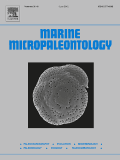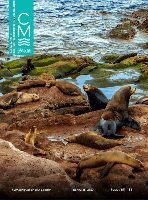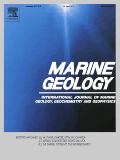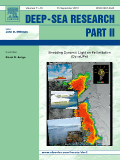
MARINE MICROPALEONTOLOGY
Scope & Guideline
Unveiling Secrets of the Ocean's Past
Introduction
Aims and Scopes
- Microscopic Marine Organisms Studies:
The journal emphasizes the investigation of various microscopic marine organisms, including foraminifera, diatoms, coccolithophores, and dinoflagellates, providing essential data for paleoecological reconstructions. - Paleoenvironmental Reconstructions:
Research published in this journal often focuses on reconstructing ancient marine environments using micropaleontological data, which aids in understanding historical climate changes and marine biodiversity. - Biostratigraphy and Paleoecology:
The journal covers studies that utilize micropaleontological techniques for biostratigraphic analysis, helping to establish chronological frameworks and understand the ecological dynamics of past marine communities. - Geochemical and Isotopic Analyses:
Many articles incorporate geochemical and stable isotopic approaches to interpret the environmental conditions of ancient marine ecosystems, enhancing the understanding of biogeochemical cycles. - Technological Innovations in Micropaleontology:
The journal promotes methodological advancements, including imaging techniques and molecular analyses, to improve the extraction, identification, and understanding of micropaleontological specimens.
Trending and Emerging
- Ecological and Environmental Signals:
A notable trend is the focus on understanding ecological signals and responses of marine organisms to environmental changes, particularly in the context of climate change and human impacts on marine ecosystems. - Use of Advanced Imaging and Analytical Techniques:
Recent studies increasingly utilize advanced imaging techniques and molecular methods, such as 3D imaging and metabarcoding, to explore foraminiferal microhabitats and community dynamics. - Interdisciplinary Approaches:
There is a growing emphasis on interdisciplinary research that combines micropaleontology with geology, oceanography, and climate science to provide comprehensive insights into past marine environments. - Impact of Anthropogenic Factors:
Research increasingly addresses the impacts of anthropogenic activities on marine ecosystems, examining how human-induced changes affect micropaleontological records and marine biodiversity. - Focus on Historical Climate Events:
Emerging studies highlight historical climate events, such as the Paleocene-Eocene Thermal Maximum and the Late Miocene-Early Pliocene Biogenic Bloom, to understand the long-term impacts of climate change on marine life.
Declining or Waning
- Traditional Biostratigraphy Alone:
While biostratigraphy remains important, there has been a noticeable decline in studies that rely solely on traditional biostratigraphic methods without integrating geochemical or ecological perspectives. - Focus on Single Taxa:
Research that primarily concentrates on single taxa, without considering broader ecological or environmental contexts, has become less common as the field moves towards more integrative approaches. - Descriptive Studies:
There is a waning interest in purely descriptive studies of new species or assemblages, as the field increasingly values studies that address ecological implications and broader environmental changes.
Similar Journals

GEO-MARINE LETTERS
Pioneering Research in Planetary and Oceanic StudiesGEO-MARINE LETTERS, published by Springer, is a prestigious academic journal that has been a pivotal platform for the dissemination of innovative research in the fields of Earth and Planetary Sciences, Oceanography, Environmental Science, and Geotechnical Engineering since its inception in 1981. With an E-ISSN of 1432-1157, this journal has established itself in the Q2 quartile across multiple categories in 2023, indicating its influential position within the scientific community, as reflected by its Scopus rankings. While it currently does not offer an open access option, its rigorous peer-review process ensures the publication of high-quality research that contributes significantly to advancing our understanding of marine and geological sciences. Researchers, professionals, and students alike will benefit from the diverse scope of studies featured in GEO-MARINE LETTERS, making it an essential resource for those engaged in environmental and marine research. Situated in Germany, the journal's commitment to excellence continues to shape critical discussions and innovations in the field.

Journal of Ocean University of China
Unveiling the Mysteries of the Deep BlueThe Journal of Ocean University of China, ISSN 1672-5182, is a premier academic journal dedicated to advancing the fields of Ocean Engineering and Oceanography. Published by the esteemed Ocean University of China, the journal serves as a vital platform for researchers, professionals, and students to disseminate groundbreaking findings and foster collaboration in marine science and engineering. With a commitment to quality, the journal currently holds a Q3 ranking in both Ocean Engineering and Oceanography as of 2023, indicating its significant contributions within the scientific community. The journal's scope encompasses a wide range of topics including marine technology, ecological studies, and coastal management, all aimed at enhancing the understanding and utilization of oceanic resources. Although currently not Open Access, it continues to attract submissions from renowned scholars, ensuring a diverse and innovative range of research. By providing access to cutting-edge research and practical insights, the Journal of Ocean University of China plays a critical role in shaping the future of ocean sciences and engineering.

CIENCIAS MARINAS
Championing Biodiversity in Aquatic EnvironmentsCIENCIAS MARINAS, an influential journal in the field of Aquatic Sciences, is published by the Instituto de Investigaciones Oceanológicas of the Universidad Autónoma de Baja California. Established as an open access platform since 2006, it aims to disseminate original research and critical reviews that contribute to the advancement of marine science. With a commitment to fostering scholarly dialogue, CIENCIAS MARINAS serves as a vital resource for academics, researchers, and practitioners interested in the ecological dynamics and biological processes of aquatic environments. Although currently ranked in the fourth quartile in Aquatic Science by Scopus, the journal remains dedicated to increasing its visibility and impact within the research community. Housed in Mexico, it offers a regional perspective that underscores the importance of coastal and oceanic research, making it an essential avenue for exploring marine biodiversity and conservation efforts. By engaging with this journal, readers can stay abreast of the latest developments and contribute to the growing body of knowledge in marine sciences.

MARINE GEOLOGY
Unveiling the Secrets Beneath the Waves.MARINE GEOLOGY, published by Elsevier, is a premier journal dedicated to advancing the understanding of marine geological processes and their interactions with the Earth's systems. With an ISSN of 0025-3227 and an E-ISSN of 1872-6151, this esteemed journal has been a vital resource for researchers and professionals since its inception in 1964. The journal is recognized for its high impact, with commendable rankings, including Q1 in both Geology and Oceanography, and Q2 in Geochemistry and Petrology according to its 2023 category quartiles. With a Scopus rank within the top percentiles in various fields, MARINE GEOLOGY offers a platform for original research, critical reviews, and significant advancements in the field, covering topics ranging from sedimentology to geochemical processes in marine environments. Although it does not operate under an open-access model, its rigorous peer-review process ensures high-quality publications that contribute to our understanding of oceanic and geological sciences. Researchers, students, and professionals alike will find MARINE GEOLOGY to be an essential resource for collaboration and discovery within the vast field of marine science.

Ocean Science
Advancing Research in Oceanography and PaleontologyOcean Science, published by COPERNICUS GESELLSCHAFT MBH, stands as a premier Open Access journal in the fields of Oceanography and Paleontology, with a commendable impact factor that highlights its influence in the scientific community. Since its inception in 2005, Ocean Science has provided a vital platform for the dissemination of innovative research and discoveries, boasting prestigious rankings of Q1 in both Oceanography and Paleontology categories as of 2023, along with impressive Scopus rankings (7th in Paleontology and 28th in Oceanography). Based in Göttingen, Germany, the journal's commitment to open access ensures that groundbreaking research is readily available to a global audience, fostering knowledge sharing and collaboration among academics, professionals, and students alike. As it converges towards its 20th anniversary in 2024, Ocean Science continues to be an essential resource for those dedicated to advancing our understanding of the marine environment and its geological history.

DEEP-SEA RESEARCH PART II-TOPICAL STUDIES IN OCEANOGRAPHY
Navigating New Frontiers in Marine ScienceDEEP-SEA RESEARCH PART II-TOPICAL STUDIES IN OCEANOGRAPHY is a leading journal in the field of oceanography, published by PERGAMON-ELSEVIER SCIENCE LTD. With an impressive ranking of Q1 in Oceanography and holding the 20th position out of 145 journals in the Earth and Planetary Sciences category, this journal provides a prominent platform for researchers and practitioners alike. Covering topical studies in oceanography since its inception in 1993, it continues to contribute significant insights into deep-sea research, enhancing our understanding of marine environments. Although the journal does not presently offer Open Access options, it remains a vital resource, appealing to students and professionals who seek to engage with innovative research and practical applications in the oceanographic community. The journal's ongoing commitment to excellence is evident as it plays a crucial role in advancing the field leading up to the present day and beyond.

Research in Marine Sciences
Connecting researchers to foster marine conservation efforts.Research in Marine Sciences, ISSN 2538-5542, is a leading journal published by ARMAN DARYA INC, specializing in the dynamic and interdisciplinary field of marine science. With a commitment to advancing knowledge in areas such as marine ecology, oceanography, and marine conservation, this journal provides a collaborative platform for researchers, professionals, and students to disseminate their findings. Although it operates under a traditional subscription model, the journal ensures that the latest research is accessible to a wide audience, promoting the understanding of marine environments crucial for biodiversity and sustainability. The journal aims to bridge the gap between theoretical research and practical applications, emphasizing the need for rigorous studies that address pressing marine issues in a rapidly changing world. By contributing to the body of literature in marine sciences, Research in Marine Sciences plays a vital role in shaping the future of marine research and policy-making.

THALASSAS
Fostering Innovation in Marine ResearchTHALASSAS is a prominent academic journal specializing in the fields of Aquatic Science and Oceanography, published by Springer International Publishing AG. Established in 2005 and running through 2024, this journal serves as a vital platform for sharing groundbreaking research and innovative findings related to the marine environment and its ecosystems. With an ISSN of 0212-5919 and an E-ISSN of 2366-1674, THALASSAS is indexed in Scopus and currently holds a Q3 classification in both Aquatic Science and Oceanography for 2023, reflecting its relevance and contribution to these scientific disciplines. Although it does not follow an Open Access model, THALASSAS offers valuable insights for researchers, professionals, and students interested in sustainable ocean management and aquatic biodiversity. Its rigorous peer-review process ensures that published articles meet the highest standards of academic quality, fostering a deeper understanding of marine sciences and addressing critical issues facing aquatic systems today.

Ocean Science Journal
Pioneering Research for Our Blue PlanetOcean Science Journal, published by the Korea Institute of Ocean Science and Technology (KIOST), is a pivotal resource for scholars and practitioners in the field of oceanography. With the ISSN 1738-5261 and E-ISSN 2005-7172, this journal presents cutting-edge research from 2006 to 2024, bridging fundamental and applied ocean sciences. Based in South Korea, with its headquarters located in Busan, the journal has achieved a commendable Scopus rank of #72 out of 145 in the domain of Earth and Planetary Sciences, placing it in the 50th percentile among peer publications. Classified in the Q3 category of the 2023 Oceanography rankings, Ocean Science Journal offers a platform for innovative studies that advance understanding of marine environments and promote sustainable ocean practices. While it does not operate under an open access model, readers and contributors can expect high-quality, peer-reviewed material that addresses pressing oceanic challenges and developments. This journal serves as an essential tool for researchers, professionals, and students committed to fostering marine science and ocean technology.

Journal of Marine Science and Technology-Taiwan
Navigating the frontiers of ocean research and engineering.The Journal of Marine Science and Technology-Taiwan, published by Nant Taiwan Ocean University, is a pivotal academic platform dedicated to the advancement of knowledge in the fields of marine science and engineering. With an ISSN of 1023-2796 and E-ISSN 2709-6998, this journal spans a wide array of topics relevant to the study and application of marine technology from 1998 to 2024. It ranks in the Q3 quartile in major categories such as Mechanical Engineering, Mechanics of Materials, and Ocean Engineering, illustrating its growing influence and the breadth of research it encompasses. Although currently not an open access journal, it provides critical insights to researchers, professionals, and students alike, making significant contributions to the understanding of marine environments and technologies. As the journal continues to evolve, its commitment to high-quality, impactful research remains central to its mission, empowering scholars to drive innovation in the dynamic field of marine science.